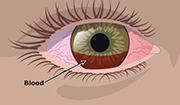
Hyphema is a pooling of blood in the fluid-filled front area, or anterior chamber, of the eye. The anterior chamber is located between the iris (the flat membrane that gives the eye color) and the inner surface of the cornea (the clear outermost layer of the eye). The anterior chamber contains a transparent gelatinous fluid called aqueous humor, which nourishes the eye and gives it shape. If blood collects in the anterior chamber, vision can be partially or completely blocked. If left untreated, hyphema1 can potentially lead to permanent severe vision problems in the affected eye.
Common symptoms of hyphema2 include:
The size of a hyphema can range from a small and undetectable spot to a highly noticeable collection of blood that impairs the vision.

Most frequently, hyphema is the result of a trauma to the eye, such as a sports injury or an accident. Other possible, but less common, causes include:
To diagnose hyphema, the eye doctors at Beach Eye Medical Group will conduct a thorough examination of the eye that includes a full vision assessment, an intraocular pressure measurement (tonometry) and possibly an ultrasound. In cases of severe injury, our eye specialists may order a computerized tomography (CT) scan to evaluate the extent of any structural damage.

References
1 What Is Hyphema? Available: https://www.aao.org/eye-health/diseases/what-is-hyphema
2 Hyphema (Bleeding in Eye). Available: https://www.webmd.com/eye-health/hyphema-eye-internal-bleeding
3 Eye Drops. Available: https://www.aao.org/eye-health/treatments/eye-drops-kinds-recommendations
Swift pinguecula surgery. No anesthesia needed. Dr. Shah was very accommodating to me because I had requested it be done simply.
Directions are easy to follow and he gets straight to the point. It's easy to see that his professionalism is what makes this practice.
I had some trouble with the front desk receptionists yesterday when attempting to pick up my eye drops, but that's the only complaint I have. The nurse I had is so sweet and kind...definitely great as well. But I'm changing my review from 5 to 4 stars just because of the receptionists. They don't even pass along messages to the doctors and are pretty rude in general.
Not many people can do this kind of surgery...I know, I aggressively researched it. It's more than a little impressive that Dr Shah was able to do pinguecula removal so quickly (5 min) and without even local anesthesia. Really speaks to his experience!